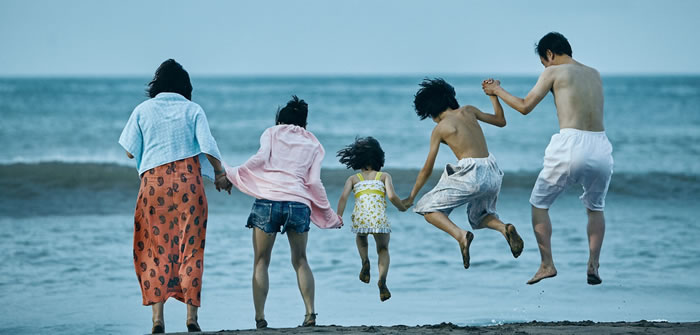Shoplifters is about life on the margins of Tokyo, where a dysfunctional band of outsiders are united by fierce loyalty, a penchant for petty theft and playful grifting. When the young son is arrested, secrets are exposed that upend their tenuous, below-the-radar existence and test their quietly radical belief that it is love—not blood—that defines a family.
Shoplifters is directed by Hirokazu Kore-eda and is in Oscar Shortlist for the Best Foreign Language Film Award and also a nominee for the Best Foreign Language Film category at the Golden Globe Awards.
The following is Cinema Without Borders interview with Kaoru Matsuzaki Shoplifters producer.
Bijan Tehrani: Please tell us what motivated your team to make Shoplifters?
Kaoru Matsuzaki: We have worked together with Kore-eda Hirokazu continually since “Like Father, Like Son”. Kore-eda gave us the idea for the next film after “The Third Murder” and we find it a very attractive plot and started to move on to the development shortly. I’ve been requesting him to make a film which could raise a question to the society from the time we finished the production of “Our Little Sister” and “After The Storm”.
BT: Is Shoplifters a continuation of Hirokazu Kore-eda films such as Nobody Knows, Like Father Like Son, and Our Little Sister?
KM: I think Kore-eda didn’t make these films as consecutive films intentionally but for Shoplifters, I see that the film embodies the essence of them. It has the eye to “invisible people” (from the word of Cate Blanchet) which is raised in “Nobody Knows”, and it is in a continuation of the question of “nature or nurture” which is themed in “Like Father, Like Son” and “Our Little Sister”.
After digging deep into the value of family, the director wanted to explore more to the society. As I explained above, it is consistent with our expectation.

BT: Does Shoplifters portray a realistic picture of the poor in today’s Japan?
KM: I think that the reality can be seen through a bit of a fantasy picture instead of a realistic picture.
BT: Will awards help Shoplifters bring awareness to the subject of the film?
KM: I suppose that the director does not think to convey something directly to the society through his films and we don’t make films in order to give a question of the social issues. But it is good that the awards will help the attention and the awareness to our society, culture and concept of family in Japan.
BT: Please tell us about casting of the Shoplifters and how Hirokazu Kore-eda worked with the actors.
KM: We decided the casting talking with the director. Kiki Kilin was from the beginning. The leading actor Lily Franky was confirmed next. For the wife of Osamu, we were looking for an older actress at the beginning. But through discussions, Ando Sakura was brought to the table and we were sure she was the one to play the role beyond the age difference. Another lady in the family, Aki played by Matsuoka Mayu, was supposed to be a chubby, not attractive girl but the director changed the setting of her role and wrote for Matsuoka’s character after he met her at the audition. For the kids, they were both selected at the audition.
In the shooting, the director did not give precise directions to the actors, rather respected how they perform and he adjusted their acting as the shooting proceeded. It happened many times that the director changed the script on the shooting day. At the scene of the interrogation room, the director gave the detective actors the dialogues of questions just before the shooting started so that the opposite roles did not know what questions were going to be asked. This shooting style drew the wonderful performance by Ando Sakura. For the kids, as usual in the shooting, the director did not give the script in advance and he told and explained the dialogues to them there.
There was an interesting moment that Sasaki Miyu as Juri lost her baby teeth during the shooting. Then the director added the scene of Juri’s losing teeth in the film. Also, the scenes of the kids running in the rainstorm and Osamu and Shota walking in the snow were added by the unpredictable weather. The director thinks that these happenings may bring something interesting and it was lucky for us that the actors accepted these sudden changes and ideas in a positive way.
BT: How do you see the chances of the film to win the Golden Globe award and get a Oscar nomination and possibly win it?
KM: Many awards have been announced since December and as you know, there are many wonderful films this year so I cannot imagine to win an award but if we have a chance, it is kind of dream come true.
Shoplifters is selected as the Japanese submission to Foreign Language Film for Academy Awards and it is really wonderful to be selected because I think the film is more or less “a culmination” of his past films, though Kore-eda does not like the expression.

